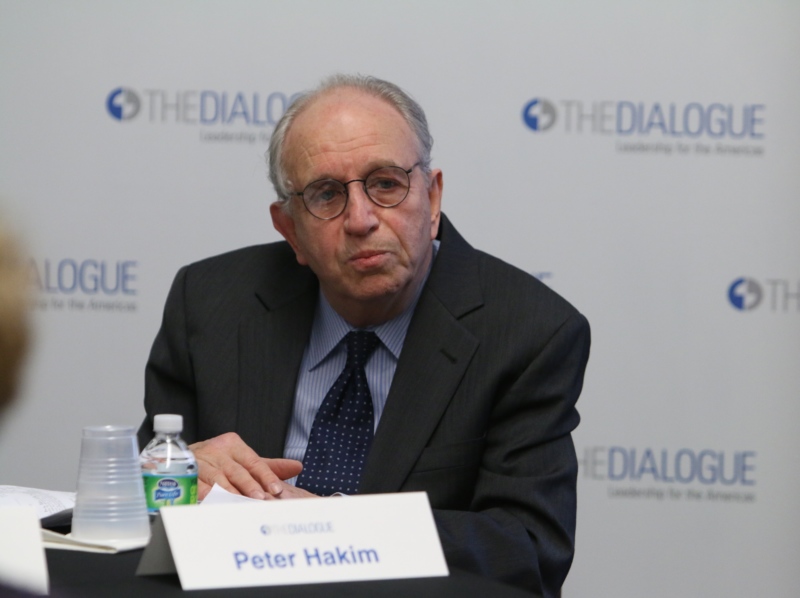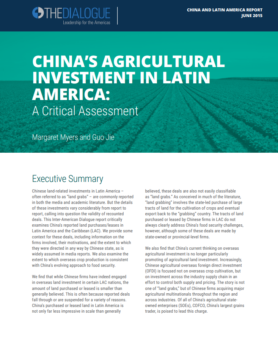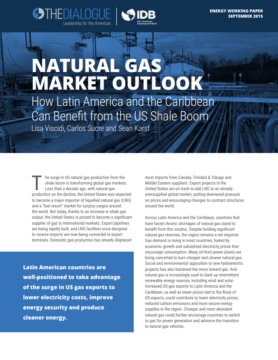The Nationalism of Cristina Fernández de Kirchner
Argentine President Cristina Fernández has increased her appeals to nationalist sentiment to build domestic political support.
Emeritus President of the Inter-American Dialogue thinktank, Peter Hakim, expresses grave concern over Trump’s direction of US policy toward Latin America.
As the world counts down the hours until Donald Trump is officially inaugurated as the President of the United States, leaders of thinktanks and global multilateral institutions based in Washington DC face uncertainty about what the future holds for their country and their institutions. The Inter-American Dialogue, a moderate thinktank and one of the oldest and most influential of its kind on Latin America, is one such organisation.
Despite the efforts of the Washington’s economic, political and governmental establishment to analyse and second-guess Trump’s behaviour and policies — trolling through the president-elect’s Cabinet choices, speeches and even tweets in order to form some type of idea of what the multimillionaire showman will do once in office — his plans, for the most part, remain unknown.
Trump’s term in the Oval Office could lead to big changes for Latin America, especially if his constant rattling of companies that build factories in Mexico start to affect other parts of the region, hurting investment and the continuity of cordial diplomatic relations that have existed for decades.
In order to garner an insight into what effect this change of administration could potentially have on US relations with its neighbours in the Western hemisphere, the Herald spoke with the Inter-American Dialogue’s Emeritus President Peter Hakim, who led the organisation through four different US presidential administrations from 1993-2010. The policy expert believes that the coming transformation of US foreign policy toward Latin America should be of great concern, as we enter a time he defined as the most stressful in US politics since the Cuban missile crisis.
Foreign policy for Trump hardly matters, believe it or not. This was not a big issue in his election. What Trump wants to do with Russia or China does not have very much resonance here. Yes, when he talks about immigration it does but that’s because it’s a domestic issue.
First the US has been moving apart from Latin America. But the US also doesn’t have anything like a Latin America policy. It has a policy to Mexico, Cuba or vis-à-vis Venezuela. You could add all those things and say it’s a policy but it’s not really connected in a real sense. We aren’t trying to persuade the Brazilians and Argentines to change their views on Venezuela. Half of US policy is to Mexico since half of the Latino population in the US is of Mexican origin and two-thirds of US trade with Latin America is with Mexico ... but by and large, South Americans have been increasingly off the US map.
Well I don’t know that. He is a man who takes great insult. I can imagine if the Chinese were to insult him or his family, Trump would be on the warpath. He has some ideas, connections, and friends in different parts of the world. I find his impulsiveness, lack of any global historical knowledge or of current events, or ability to form a strategic vessel to keep any of this together to be a danger. I think he has had some strong people around him — his Defense secretary choice (James Mattis) and Rex Tillerson at the State Department — who could conceivably rein him in. Trump is probably going to make some bad mistakes and judgments, and push in certain ways that are not very helpful over time. And there are going to be costs to pay and damage done.
I think Barack (Obama) had a multilateral approach to all of this. But I don’t think he put a lot of confidence in these institutions .... Obama completely neglected the OAS, never put any effort at all. We had the worst representation in the OAS of the past eight years, than we ever had in my memory.
(Economist) Larry Summers says that the US will never have a good foreign policy because one party has no respect for international institutions and the other party is dead set against international trade — which is the Democrats. And Trump is against both of them. It’s not even one or the other.
Let me just say when Macri was elected, he immediately became the favourite of the US. Former Brazilian president Dilma Rousseff was going through traumas, and the US is just trying to avoid getting involved with that. Mexico was enmeshed with President Enrique Peña Nieto, who was (caught up) in various scandals. You go country by country, and here is Macri, a businessman who will settle the debt issue with the US and says all the right things. And I think this went on for a while, but there was not much that the US could do for Argentina. It could raise its diplomatic profile and occasionally you would see a senior US official visit and meet with the Argentine president at international meetings. But Argentina wants more trade with the US, and US investment — 95 percent of that is up to the private sector.
I think the Fund is there. Macri has worked hard to balance politics and economics. It seems to me that he is moving more toward making changes in the economy, than listening to political advice, which is a dangerous road. But the austerity hasn’t been enough to generate business confidence and kickstart the economy. I think the honeymoon will subside in 2017, with the legislative elections. If one or two of his economic measures are rejected this year, he could find himself in a lame-duck government this year.
He has received a lot of pressure from the Inter-American Commission of Human Rights and international organisations such as the UN over Túpac Amaru leader Milagro Sala’s jailing.
That sounds like a silly case. I don’t know why he has given into whoever runs the province (Jujuy Governor Gerardo Morales) in which she was arrested in. It just seems to me that it gives the Left and the Peronists so much ammunition and there is no need to do that. It is a battle that is just not worth fighting.
They can be divided into different groups. One is the military, which is very prominent. I don’t know what it exactly means that he has chosen such different people from the military. Certainly General John Kelly, who is in the department of Homeland Security and who was head of the US Southern Command is fervent anti- illegal immigration and against drugs, but he recognizes the complexity of the relationship with Latin America. And General James Mattis was the one to convince Trump that torture was not the way to go. So it’s very hard to find common ground. Then you have, what I consider the best part of the candidates, the people he put in the Treasury and Commerce departments. These are people who know their field, whatever you say about Goldman Sachs. These are companies that are worldwide and sophisticated.
We call that the ‘Golden Age’ (he laughs). Yeah, I think it did matter. The Dialogue has a very bipartisan board but it tends be more moderate, more international, to work easier with some of the Democrats, although we clash with the Democrats on free trade very openly. Trump is going to be more difficult.
Or it could make it more relevant. Latin Americans are concerned about US relations, they may have not liked George W. Bush very much but he looks like a sweetheart compared to Trump. Trump seems not to have any kind of binding, connecting tissue between the various issues. There is that lack of logical connection. It just doesn’t quite all come together. Is that a tactic of Trump or simply he doesn’t have that connecting tissue? Is this going to continue when he becomes president? Or are we going to have the general type of leaders we are use to having?
Once you get beyond Mexico we have no data on the rest of Latin America on what Trump is going to do. I think the best guess, if you had to make a guess, is that Trump will end up creating more damage. His term in office will be damaging for US foreign relations. But we don’t know how much damage, and where that damage is going to occur.
None which I can see. That in part is because he doesn’t read and has very little historical background. It’s just a bizarre situation. It’s fun talking about, but not thinking about it.
Argentine President Cristina Fernández has increased her appeals to nationalist sentiment to build domestic political support.
China is looking for new agricultural investment opportunities in Latin America, but not necessarily for large tracts of land.
Given their close proximity to the United States, LAC countries are well-positioned to capitalize on the surplus of US gas exports and current buyer’s market.
 Washington DC March 15, 2016 © Rick Reinhard 2016 email rick@rickreinhard.com
Washington DC March 15, 2016 © Rick Reinhard 2016 email rick@rickreinhard.com

